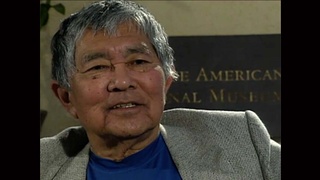Interviews
Realizing Importance of Birthplace
I think it goes way back to the first time I ever filled out a form—“Where were you born?” You put “Manzanar Relocation Center.” You find yourself having to explain it because people say, “Manzanar, where is that?” Or just the fact that putting “Relocation Center,” and not really knowing. Kind of knowing what it means—that Japanese were put in these places, and that I was born in the sabaku, in the desert. Knowing these things but not really fully understanding it.
I really began trying to understand it I think when I was, again, early in college. Probably like Alan. When in government classes, I had to do a paper, I did it on the racism in the internment of the Japanese American. I read all of Gordon’s books and things like that doing the research. It was very enlightening to me. It did politicize me in many ways.
Date: December 10, 2004
Location: California, US
Interviewer: Art Hansen, Sojin Kim
Contributed by: Watase Media Arts Center, Japanese American National Museum










